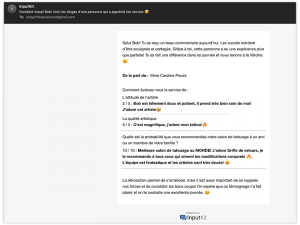Employee engagement can be a real factor for failure or success within companies. To maximize the engagement of your teams, you must first ensure the satisfaction of your teams at work. A satisfied employee with their working conditions and who identifies with the values and objectives of your company will be ready to give their best to complete their tasks.
How can you ensure your teams are engaged regarding your organization? Ask them directly for feedback via employee engagement surveys and questionnaires! The valuable information gathered from these surveys will allow you to continuously improve your employee experience to ensure the engagement of your staff members.
To enlighten you on this topic, we have identified ten best practices to follow to maximize your teams’ engagement at work, as well as thirty-five examples of questions to ask during an employee engagement survey or questionnaire for your company.
Definition of Employee Engagement
To begin, let’s address the nuance between satisfaction and engagement at work.
- Satisfaction at work is the level of contentment your teams have towards their jobs and working conditions. It calculates an employee’s satisfaction with their working conditions, the company’s organizational culture and much more.
- Engagement at work, on the other hand, is an emotional indicator of an employee towards the company for which they work. For example, employee engagement surveys and questionnaires calculate how much effort your teams would be willing to put into your business.
While these two concepts are separate, it is important to note that employee satisfaction has a crucial impact on their commitment to your organization. An employee who is satisfied with their working conditions will be much more engaged at work, since they will be more inclined to give the best of themselves to offer an unforgettable customer experience. Similarly, a disengaged employee is at high risk of doing the bare minimum, or even leaving your business as soon as the opportunity presents itself. That’s why it’s important to send out regular employee engagement surveys and questionnaires. Through these surveys, you will be able to assess your employees’ commitment to take action and improve their loyalty to your company.
Download now: -> Free French Checklist for Welcoming and Onboarding your New Employees!
In terms of definition, there are three types of work engagement:
- Emotional engagement: The employee is committed to the company because they identify with the company’s values and organizational culture.
- Normative engagement: The employee is committed to the company because they have a sense of moral debt, even loyalty, to their employer as well as to their co-workers.
- Instrumental engagement, or by material obligation: The employee is forced to work for the company, for lack of job alternatives or lack of money.
Emotional engagement is the most important for your employees: loyal teams committed to your values will represent the mission of your company. In this sense, during your employee engagement surveys or questionnaires, remember to ask your employees about their sense of belonging to your organization. This will help you understand what actions you can take to improve your organizational culture and increase your talent retention!
What are the components of employee engagement?
Avant de créer vos sondages pour évaluer l’engagement de vos employés, il est important de bien comprendre les différents facteurs impactant sur l’engagement de vos employés vis-à-vis de votre entreprise.
Before creating your employee engagement surveys and questionnaires, it’s important to understand the different factors that impact your employees’ engagement with your company.
To shed light on this topic, here are the top ten levers of workplace engagement:
- Clarity of the position and assigned tasks;
- Effective management of resources
- The quality of relations between employees and their managers;
- The quality of relations between colleagues;
- The autonomy of employees;
- Well-being at work;
- Professional accomplishment;
- Identification with the company’s values;
- Employee involvement in important decisions;
- Recognition at work.
By knowing the different components of engagement at work, you will be able to improve it! In addition, by sending regular employee engagement surveys and questionnaires to your teams, you will be able to identify if internal practices need to be optimized.
First of all, did you know that in 2022, 89% of employees would be disengaged from their company. In addition, according to VIACONSEIL, 20% of employees would be actively disengaged, so much so that their actions could actively harm your organization. Such employees could cause your customers to complain, turn to a competitor, or even create a bad brand image.
Yet, the commitment and loyalty of your teams have many benefits for your business:
- On average, engaged employees are 21% more productive;
- Engaged employees have 41% less absenteeism than indifferent or disengaged employees;
- Companies with a high retention rate have 59% less staff turnover;
- On average, organizations with a higher percentage of engaged employees generate 23% more revenue.

How to improve employee engagement at work?
Now that you understand the factors impacting your employees’ engagement, it’s time to send your employee engagement surveys and questionnaires to find out how engaged your teams are. However, based on your employee engagement surveys and questionnaires, do you know what steps you can take to improve the engagement of your teams at work?
Here are ten best practices to help you maximize your employees’ commitment to your business.
1. Plan an effective onboarding process for new hires to maximize their engagement
Imagine starting a new job. However, when you arrive, no one welcomes you. You are given your uniform and are encouraged to integrate your position without describing the tasks you have to complete. You want to ask your colleagues for information, but since no one has been introduced, you are too shy to ask for help. Finally, after a few weeks, you are discouraged by the lack of explanation for the tasks assigned and your difficult integration into your team. You decide to quit your job in the hope that the next one will greet you better.
According to SHRM, 20% of employees leave during their first month due to similar integrations. Avoid repeating this bad example: send regular employee engagement surveys and questionnaires to your new recruits to ensure they are welcomed and integrated into your company. This way, you will give them a good image from the start, which will encourage them to work for you.
Engagement surveys and questionnaires for new employees, combined with regular bi-monthly meetings, will help you keep track of your new talent. Understanding of assigned tasks, workplace well-being, team integration, quality of interpersonal relationships and more: proactive and effective follow-up will give your recruits a sense of belonging and importance. In return, they will want to give their best in order to continue working in your company!
2. Contribute to the professional development of your employees
When it comes to commitment to work, it is important to remember that every human being is different. In this sense, each of your employees has different interpersonal skills, fields of expertise and fields of study.
To maximize the engagement of your employees, why not assign them positions and tasks related to their personality, preferences and expertise? This good human resources management will allow you to increase the satisfaction and commitment of your teams at work, but also to offer your customers the best possible experience!
For example, after sending out employee engagement surveys and questionnaires, record the feedback received and then take action:
- Offer relevant up-to-date training related to the tasks requested;
- Distribute tasks equitably to reduce the risk of burn-out.
These strategies will allow you to optimize the performance of your employees while reducing their level of stress at work. They will be able to offer a service to the best of their knowledge, which will make your customer experience unique and optimal. Moreover, such a tactic will certainly increase the retention and commitment of your existing teams. That’s why it’s important to send internal employee engagement surveys and questionnaires regularly!

3. Question your employees regularly to maximize job satisfaction
In order to have engaged employees, you first need to ensure their satisfaction at work. After all, an employee who is dissatisfied with their working conditions is likely to be disengaged from their company and seek an alternative job. They could even go work for one of your competitors!
To prevent this from happening, send regular engagement surveys and questionnaires to your employees. Ask them about their well-being and satisfaction at work to continuously improve their experience. This will help you build an organizational culture of respect and trust while providing exceptional working conditions. This will set you apart as an employer and make your teams want to work for you!
Did you know that InputKit will soon be offering a solution to send employee engagement surveys and questionnaires to your employees? With our personalized and automated employee questionnaires, you’ll know everything about engagement and your staff’s satisfaction at work. This will allow you to make informed decisions based on concrete feedback to show your employees that their opinions matter to you. This is a significant asset in optimizing the engagement of your teams at work!
4. Create the right relationship between your employees and your managers
According to Entrepreneur, a manager who demonstrates clarity, honesty and transparency can increase your employees’ commitment by up to 94%. This statistic proves the importance of relationships between employees and their managers!
To ensure the quality of interpersonal relationships within your company, send employee engagement surveys and questionnaires. Once the results are collected, take action based on your employees’ needs.
For example, set up bi-monthly meetings between your managers and employees to ensure a good understanding of the tasks assigned. Set realistic goals with clear timelines and encourage managers to coach their respective teams throughout the process.
When training your managers, promote empathy, transparency, and flexibility. In this way, they will lead your employees in a respectful and honest manner, while showing mercy and availability. This will have a positive impact on the engagement of your teams!

5.Show appreciation to your employees
Did you know that workplace recognition has a crucial impact on the engagement of your staff? Indeed, according to a study conducted by HubSpot, 69% of employees would work harder if their work were better recognized by their colleagues and their manager.
To improve employee engagement, regularly recognize their efforts within your company. A post on social media, a word to say thank you, a board dedicated to the successes of the week, recognition activities, a work environment based on respect and empathy: there are many ways to show recognition at work. Be sure to send out employee engagement surveys and questionnaires to see if you recognize the efforts of your existing teams. A positive atmosphere based on recognition and trust between colleagues will have a beneficial effect on the engagement of your employees.
6. Share positive feedback from satisfied customers with your teams
Sharing positive feedback from your satisfied customers has a significant impact on the satisfaction of your staff. To that end, did you know that these positive comments are also beneficial to your teams’ engagement towards business?
This feedback shows the members of your organization the concrete impact of their services on the satisfaction of your customers. By reading these reviews, comments and suggestions, your employees better understand the nature of their work and see the positive changes they are making in the lives of their clients. This is an essential strategy to motivate your employees while optimizing their engagement to the workplace.
In fact, InputKit offers the ability to automate the sharing of positive feedback from satisfied customers with your staff. This functionality, combined with employee engagement surveys and questionnaires, will ensure you are better motivated and engaged in your teams at work!

7. Host special events for your employees
To show your teams that they are important to you, why not celebrate their successes by organizing special events? Anniversaries, years spent in the company, dining out, team-building activities: every opportunity is good to show your employees that they matter to you. This great recognition will reinforce your employees’ emotional commitment to your business, as they will feel valued and appreciated by your organization.
Similarly, these opportunities represent a great opportunity for your teams to get to know each other as human beings. As a result, your staff members will feel more valued by their colleagues and will be able to identify with your company’s organizational culture. This is a must-do strategy to make your employees happier at work!
8. Present a clear organizational vision
Of course, your employees will become more committed to your business if they understand its main objectives. What better way to do this than to involve them in your important team meetings and decisions?
At your meetings, include members from your different departments to get an overview of upcoming decisions. These opinions will help you make the best decisions for your business while considering the opinions of your employees. This strategy is ideal to show your teams how important their opinions are to you!
Once your decisions have been made, explain your next objectives to your departments. By presenting a clear organizational vision, you will share clear and defined objectives with your teams. This will allow them to better adapt to future changes!
Through your employee engagement surveys and questionnaires, don’t forget to ask your teams about their understanding of your organizational vision and their involvement in the workplace. A committed employee will understand your future goals and will do anything to achieve them!
9. Offer competitive working conditions
As previously mentioned, engagement and job satisfaction are two extremely related topics. A satisfied employee will be much more likely to be engaged toward your business. Otherwise, a colleague who is dissatisfied with their working conditions is likely to leave your business for one of your competitors.
In this regard, send out regular employee engagement surveys and questionnaires to ensure the quality of the working conditions offered by your company. Then, improve your employee experience and continuous working conditions based on the results obtained. For example, you could offer:
- A competitive salary;
- A flexible schedule;
- Sufficient holidays;
- A comfortable workstation;
- Clean and friendly offices;
- Free snacks and coffee;
- A fast WIFI;
- Efficient computers;
- Insurance plans;
- Preventive measures for physical and mental protection;
- And more!
During an exit interview survey, also take the time to question your employees to better understand the aspects that may have caused them to resign. This will allow you to better identify gaps in your employee experience and quickly rectify the situation.
Be proactive: send regular employee engagement surveys and questionnaires to ensure the quality of your working conditions. An employee with competitive working conditions will want to stay to work for your company. This exceptional experience will contribute to their well-being: they will be more inclined to give their best to improve your image as well as your customer experience!
10. Encourage innovation and autonomy
To maximize the engagement of your teams at work, it is important to encourage innovation and autonomy. After all, no one wants to be managed at every event and gesture in their workplace!
Micro-management is the action of excessive and controlling management on the part of your managers, which can completely dissuade your employees from working for you. They will feel that no initiative is good enough for the company and will eventually withdraw completely from the tasks requested. In addition, such management is very stressful for your teams, since they will be constantly afraid to disturb or disappoint your managers. This is definitely a practice to avoid!
To encourage innovation and autonomy within your company, send regular employee engagement surveys and questionnaires to validate the good relationship between your teams and your managers.
Involve your employees in important decisions in your organization and always consider their opinions. At work, let your teams take the initiative to ensure a unique and extraordinary customer experience. This practice will encourage your employees to be autonomous and reduce the workload of your managers. In addition, your employees will feel appreciated and respected, since their actions and decisions will have a concrete impact within your company. That’s why it’s important to send regular employee engagement surveys and questionnaires!
InputKit: the ideal tool for conducting employee engagement surveys and questionnaires
With our employee evaluation and motivation software, it is possible to automatically share the positive feedback and reviews from your satisfied customers with your staff. This feature will allow your teams to see the real impact their services have on the lives of their clients. You will be able to hold your employees accountable for the quality of the service provided, but also motivate them by sharing constructive and positive feedback about their good work. This will have a positive impact on the engagement of your employees, who will be more inclined to give their best to offer an extraordinary experience!
In addition to empowering and motivating your teams at work, our online review improvement solution will help you improve your company’s reputation. InputKit targets your ambassadors: for each completed survey, we invite your satisfied customers to leave a positive review online. This tool will allow you to improve your awareness, but also the commitment of your employees. By showing them that their service is recognized and appreciated, they will certainly want to contribute to the well-being of your customers by offering exceptional service!
35 ideas for questions to ask in an employee engagement survey
The main purpose of an employee engagement survey or questionnaire is to calculate how much effort your employees would be willing to put into your business. This data can be affected by many factors. Employee well-being at work, interpersonal relationships, career opportunities, working conditions, communication and more: it’s very important to understand these issues, as they all have a crucial impact on the engagement of your teams at work. After all, the happier an employee is working for you, the more engaged they will be to your business!
To help you write the perfect employee engagement survey or questionnaire, here are thirty-five examples of questions to ask about your employees’ engagement to your company.
Employee well-being at work
- Does the assigned position match the description you read when you joined our company?
- Are the tasks assigned to you clear?
- Do you understand the objectives of our company?
- Do you feel that our company is making the necessary efforts to maximize the well-being of employees at work?
- Does your work sometimes have an impact on your personal life?
Career development and opportunities
- Does the work done in our company give you a sense of professional accomplishment?
- Are our company’s career development opportunities attractive?
- Does our company provide the necessary training to perform the work requested?
- Is the equipment provided by our company adequate?
- Do you plan to work for our company in the coming years?
- On a scale of 1 to 10, how likely is it that you would recommend us as an employer to a relative or family member?
Team dynamics and communication
- Is the support provided by your manager sufficient?
- Do you enjoy working with your colleagues?
- Do you feel recognized by your peers for the work you do?
- Do you think communication between departments is clear and effective?
- Is our internal chat platform suitable for your needs?
- Do you feel valued by your co-workers?
- On a scale of 1 to 10, how satisfied are you with your relationship with your manager?
- On a scale of 1 to 10, how satisfied are you with your relationship with your co-workers?
Organizational culture
- Do you agree with the values of our company?
- Do you have enough time to complete your tasks in the time requested?
- In your opinion, is the workload fairly distributed?
- Do our workspaces meet your needs?
- Are you comfortable with our work schedule?
- Is our salary adequate?
- Are you satisfied with our work policies?
- Are you satisfied with our insurance benefits?
- Do you think our working conditions are satisfactory?
- Do you have a good work-family balance?
Open-ended questions
- How would you define your relationship with your co-workers?
- How would you define your relationship with your manager?
- What training would you consider appropriate for new employees?
- What factors might cause you to leave our company?
- What can we do to improve our working conditions?
- Do you have any other suggestions for improvement for the future?

Do you want to improve your talent retention and the quality of your customer experience? If so, follow our best practices to maximize engagement with your teams!
As soon as your recruits are onboarded, send regular employee engagement surveys and questionnaires to ensure their engagement at work. Contribute to the professional development of your teams by offering them competitive working conditions, by promoting innovation and autonomy, and involving them in the important decisions of your company.
To find out the level of well-being of your employees within your company, send out employee engagement surveys and questionnaires. Follow our best examples of surveys and questions to ensure your teams are engaged in your business. With feedback, implement strategies to improve relationships and recognition at work. A word to say thank you, an activity with colleagues, a one-on-one meeting with a manager, a board for positive feedback from satisfied customers: any opportunity is good to celebrate the good work of your employees!
Do you need external support to help you create your employee engagement surveys and questionnaires? If this is the case, don’t hesitate to schedule a completely free and personalized demo of our solution. Our team of employee experience experts will help you write the perfect questionnaire according to your needs, at your convenience.
FREE CHECKLIST
10 best practices for integrating new employees into your company!



Related articles

Receive our best articles and tips by email
Be the first to know about our new articles.




